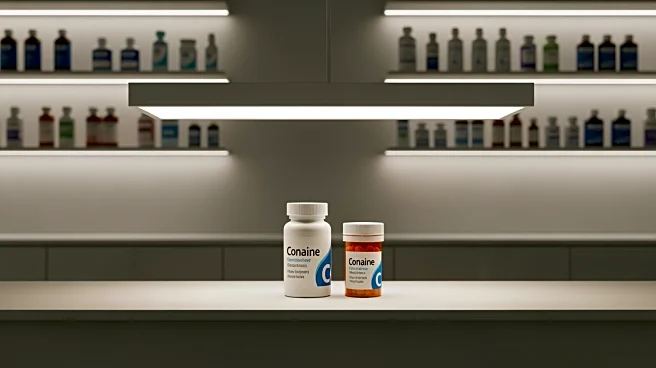What's Happening?
Novo Nordisk and Eli Lilly have reached an agreement with U.S. President Donald Trump to lower the prices of their GLP-1 weight-loss drugs. This deal aims to make these medications more accessible to patients under Medicare and for cash payers. As part
of the agreement, the companies will receive relief from tariffs for three years. Despite the anticipated increase in volumes under Medicare, Novo Nordisk expects a 'low single-digit' negative impact on global sales growth next year due to the reduced prices. The announcement led to a 2.3% drop in Novo Nordisk's shares on the Copenhagen stock exchange.
Why It's Important?
The deal is significant as it addresses the affordability and accessibility of weight-loss drugs in the U.S., potentially benefiting a large number of patients. By reducing prices, the agreement could lead to increased usage of these medications, particularly among Medicare beneficiaries. However, the price cuts pose a challenge for Novo Nordisk, impacting its short-term sales growth. The relief from tariffs and expected increase in Medicare volumes may offset some of these challenges in the long term. This development highlights the ongoing efforts to manage healthcare costs and improve patient access to essential medications.
What's Next?
The deal may prompt other pharmaceutical companies to consider similar pricing strategies to remain competitive in the U.S. market. As Medicare coverage for GLP-1 drugs expands, private insurers might also adjust their coverage policies, potentially leading to broader access and lower out-of-pocket costs for patients. The long-term impact on Novo Nordisk's sales will depend on how these changes affect drug volumes and market dynamics. Stakeholders, including healthcare providers and insurers, will likely monitor the situation closely to assess the implications for patient care and industry competition.
Beyond the Headlines
This agreement could influence broader healthcare policy discussions in the U.S., particularly regarding drug pricing and access. The collaboration between pharmaceutical companies and the government may set a precedent for future negotiations aimed at reducing healthcare costs. Ethical considerations around drug pricing and access to treatment are likely to be part of ongoing debates, as stakeholders seek to balance profitability with patient needs.
















